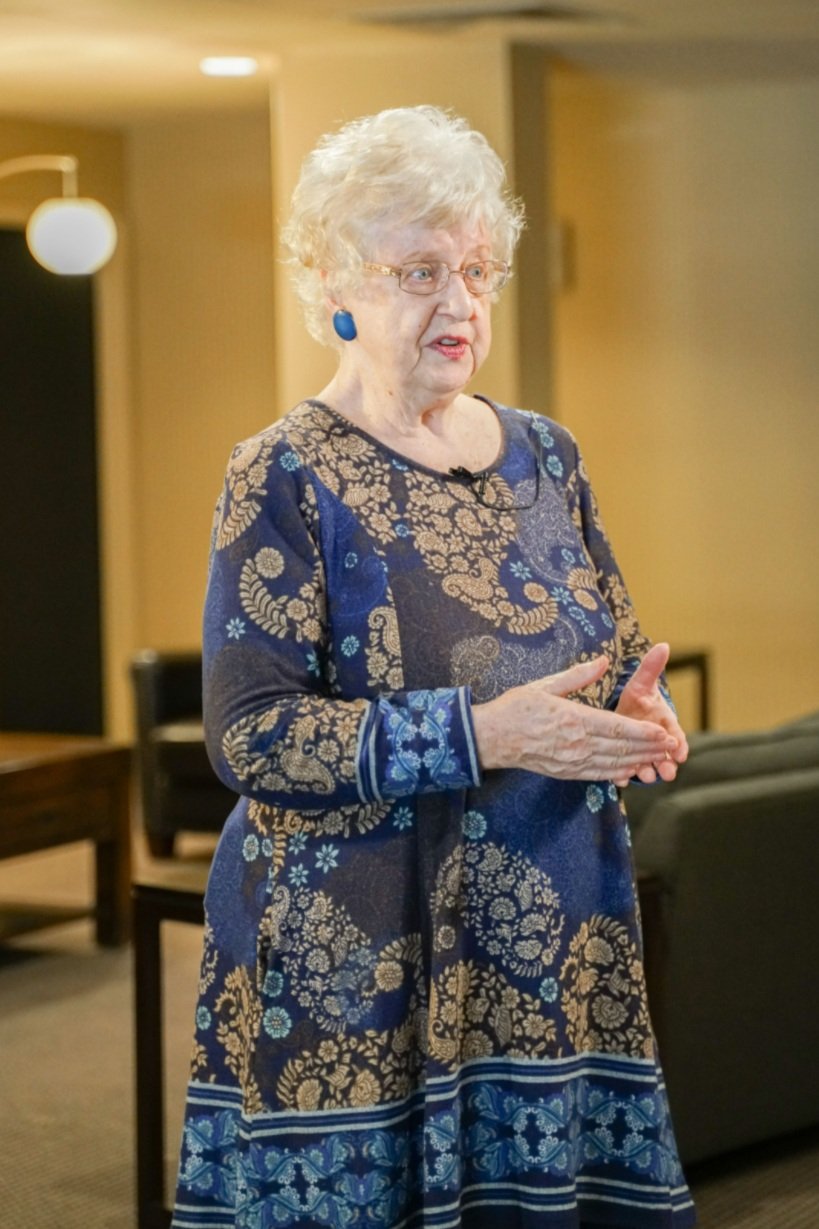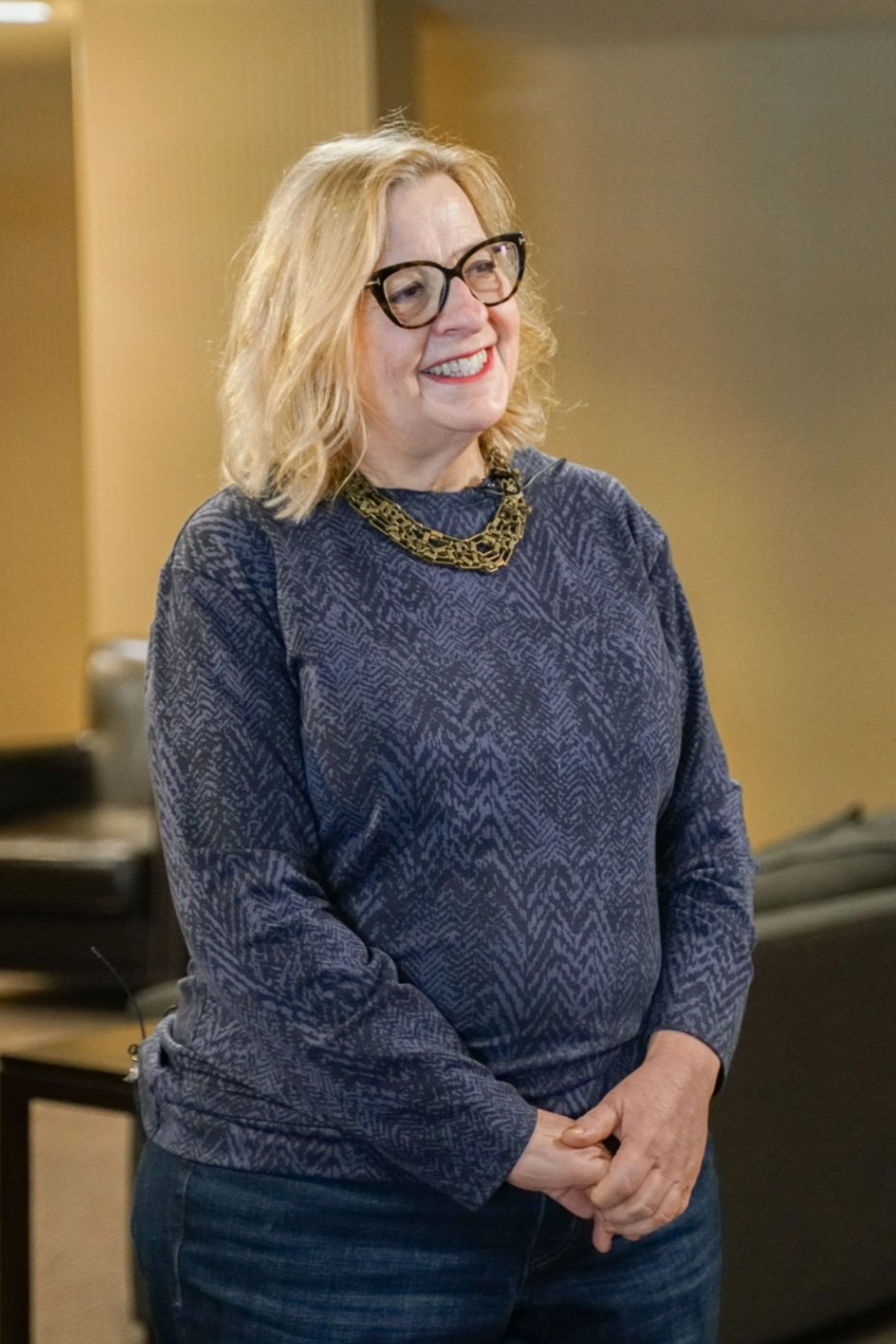In Good Company: with Mosaic Village Cohousing
In Good Company with Mosaic Village Cohousing
The RNDSQR team sat down with Mosaic Village board members, most of whom have been part of the journey from the very beginning. John and Jocelyne, Murray and Eilis, Lucille and Mieke share about what drew them to cohousing, what makes this particular building unique, and how they’re hoping it will shift our idea of what it means to belong to a community.
Who: John, Jocelyne, Murray, Eilis, Lucille and Mieke
Project: Mosaic Village
RNDSQR: What is co-housing?
John: Cohousing is a design of housing with private spaces plus amenities you would have in a condo, but in a way where you would intentionally bump into your neighbours. It’s for any age group and ideally, designed to be intergenerational.
What drew you to cohousing?
John: I was attracted to cohousing because as I age, I asked myself: where do I want to live? I didn't want to stay where I was now – we have three bedrooms, lots of stairs, and lots to maintain on the property. The space is just bigger than what we need. We started to look into cohousing and thought, wow this might be it.
Jocelyne: I grew up on a farm where I knew the neighbours and we all had each other's back and helped each other. I really wanted to kind of get back that sense of community that I grew up with where neighbours help each other.
Eilis: We live in a beautiful condo building right now. Ideal but no sense of community at all. I was raised in a small idyllic Irish village, which was wonderful to grow up in, until you get to a point where it suffocates you.
Cohousing started in Denmark and it’s tried and true over the years, and there’s a blueprint for living harmoniously together in Creating Cohousing by Katie McCamant. So what really made me stay was the business-like attitude to cohousing. It’s not just loosey goosey living together. Somebody said it's a surefire way to kill each other if you don't have some kind of a way to do it. And that [business-like plan] is what made me stay. It's hard work but it’s really great.
Murray: I'm an introvert and was very apprehensive about coming into cohousing at first. Cohousing looked good because our sons live elsewhere, but I was still unsure. I said: I need to meet the people to see if I am comfortable. We went to a potluck and were enthralled by the people there.
“What really made me stay was the business-like attitude to cohousing. It’s not just loosey goosey living together. Somebody said it's a surefire way to kill each other if you don't have some kind of a way to do it. And that [business-like plan] is what made me stay.” – Eilis
What are you most excited about?
John: From an introvert's perspective, if I want some space, I can have my privacy. If I want community (because introverts aren't hermits afterall), we can go downstairs and chat and enjoy meals together. In most cultures, people engage by breaking bread and sharing food which is so valuable but lost for many people here.
Jocelyne: Cooking nice big meals as well as teaching cooking. Having younger people around and learning from teenagers and kids. In a Western individualistic society, we are not taught to build community and I am hoping that we will also be an inspiration for other groups who are looking for a sense of community.
Lucille: I play guitar and banjo and sing, so I'm really looking forward to singing and playing with other people without having to get in my car and go across town. I'd be remiss if I didn't mention our meals: We're planning to have meals in our community dining room twice a week.
Eilis: The sharing of resources and the sharing of ideas. Of course the community but I also like to be able to close my door and go home without anyone bothering me.
“From an introvert's perspective, if I want some space, I can have my privacy. If I want community, we can go downstairs, chat and enjoy meals together. In most cultures, people engage by breaking bread and sharing food which is so valuable but lost for many people.” – John
What are some of the benefits of cohousing?
John: You can have your personal space when you need it and then when you want other people in the community, you make the decision to step out and there's other people there.
You don't have to be close friends with everybody, but you learn to appreciate each person for who they are and what they bring. With cohousing, you share responsibilities based on what you like. Many of us enjoy landscaping, and while we do that, others will be getting a big dinner ready.
Murray: I used to work for a large oil company and was concerned about how we were going to make decisions in a group. But I’ve come around to the fact that the consensus approach is superior. It takes more time and energy, but when we agree on something, we go forward with it.
Lucille: As an introvert, my friends and I like to socialize differently. We’re not antisocial, we just prefer smaller groups or doing things like hiking, kayaking, gardening or cooking. There’s lots of opportunities for that.
“I’ve come around to the fact that the consensus approach is superior. It takes more time and energy, but when we agree on something, we go forward with it.” – Murray
What’s the difference between co-housing and living in an apartment with public spaces, like a condo?
Murray: We’ve been on our condo board for 10 out of the 20 years we’ve lived there. The issue is there’s no community here. I don’t think the architects necessarily designed it that way, but it’s not designed to meet others, which can be good for some, but it can also be lonely. Cohousing is the dead opposite of that. It doesn’t have to be a big effort – it just happens when you walk out of your unit. It’s built for natural interactions and community.
Lucille: A condo board makes all the decisions, and sometimes there’s a new set of rules and the owners/residents had no say. In cohousing, we're all going to be on the board and make decisions collaboratively. We're coming together with the intention of collaborating and coming up with solutions that work for forever. Also you’re not paying for a property manager or landscaping. The upfront cost might be higher, but you’re paying less in fees because we're sharing the responsibilities.
“I don’t think architects necessarily design it that way, but [condos] are not designed to meet others; they’re designed to be very private, which can be good for some, but it can also be lonely. Cohousing is the dead opposite of that.” – Murray
Tell us a bit about Bowness and the community there.
Eilis: Bowness is kinda like a little town. It used to be a village of its own, so there's a ruralness about it. It’s a very proud community, and I’ve noticed people there have their own bumper stickers saying “I love Bowness.” People call themselves “Bownesians.” We really like the area and the whole concept of it.
Mieke: It had to grow on me to be honest. But I’ve gotten to know the neighbourhood and the people around there. I am starting to feel more at home. I live in the Southwest now but I used to live in the Northwest so it feels like going home. We have good contact with the community and it’s a great place to live.
What has it been like working with RNDSQR?
Murray: I met with Al and his brother accidentally at another event. He said: “we build condos, but we need to build more communities.” That really resonated and we've had great success. In many ways, they’ve held our hand and provided all of the technical advice.
Lucille: We've picked an awesome developer. Alkarim is an out of the box thinker and we’re pretty out of the box, so they’ve been super supportive. The project manager, Charlotte, has also built an excellent relationship with all of us.
Eilis: They're building in the community, they're involving the community and I'm thinking: These guys are for us. The project manager is great, the architects have been great, everyone is great and they just get it.
“Al said to me: we build condos, but we need to build more communities. That really resonated.” – Murray
What are some of the concerns people have about cohousing?
Murray: Many people are concerned about what they're going to do with all the things that they've amassed over their lifetimes. But besides buying the space, you're buying this common area as well.
Mieke: Introverts can be concerned. I understand because I love my private time; to sit and meditate, or sit in the sun with no one around me. But we respect people, where they come from and what they need. There will be lots of interaction and also privacy.
Lucille: People initially think it’s kind of pricey. But our operating prices and ongoing costs are going to be so much lower because we're doing the work. We’re not paying a property management company, landscapers, etc.
Charlotte Venables from the RNDSQR team joined us for the conversation. We asked her about the partnership and shared values between Mosaic and RNDSQR, and how the design of the building is intentionally making space for community interaction.
What is Mosaic Village Cohousing?
Charlotte: Mosaic Village is a community of people who are interested in the cohousing concept, which is basically a group of people coming together who want to experience the full living aspect, focusing on group benefits instead of just individuality.
There’s been a rise in cohousing since 2020. Do you have any ideas why that is?
A lot of us are feeling isolated at home, not able to see our loved ones. Cohousing addresses that because the community is already there and allows everyone to come together in a community.
How does RNDSQR connect the needs of the community with the design of the building?
Cohousing requires multiple community spaces for people to gather that serve multiple generations. The main floor is full of common amenities such as:
A bike storage room, a craft room, a music room that can also be used for meditation and yoga, a meeting room, a kid's play area, a common kitchen area with lots of storage, a big dining room for family gatherings, buffets, and entertainment. There’s a seating room with a fireplace, a guest room for people who are visiting, a laundry room and a wonderful rooftop patio space.
They also have a large focus on sustainability and are forward-thinking, so they’re considering things like future solar panels and electric car charging stations. So their empathy and value for everyone speaks to the design and what’s included.
How do Mosaic’s values align with RNDSQR?
RNDSQR is all about sustainable living. We talk often about missing middle design; a lot of people are forced to move to the suburbs for affordability but RNDSQR really focuses on merging community and individual needs into design. And that's where Mosaic and RNDSQR resonate well together: they're really focused on the community, placemaking, sustainable design and the longevity of every project.
Mosaic Village is looking for neighbours who are interested in purchasing units and securing their space. The building is set to be completed in 2023. For more information, contact info@mosaicvillage.org.
READ MORE ↓







